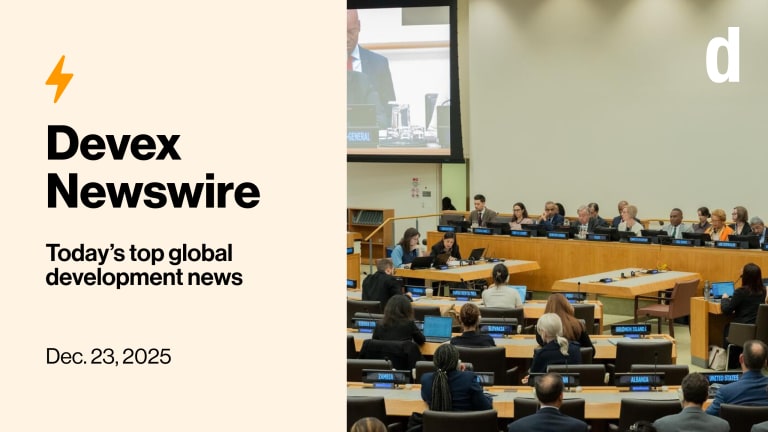
“Outrageous,” “brutal,” and “lethal.” Those are some of the words used to describe the international portions of a budget package put forward by the U.S. Congress on Wednesday.
With a government shutdown deadline looming, U.S. lawmakers advanced a budget proposal for fiscal year 2022 on Wednesday that included far less funding for global development, global health, and other international affairs programs than many advocates had hoped.
This is a preview of Newswire
Sign up to this newsletter for an inside look at the biggest stories in global development, in your inbox daily.
The bill includes $58 billion for the baseline international affairs budget, which is only a 1% increase over last year’s appropriation and less than both lawmakers and the White House had previously outlined. The bill also includes $6.9 billion for the State Department and USAID to assist Ukraine.
The topline figure alone was a major disappointment for those who hoped a more sympathetic White House working with supportive lawmakers on Capitol Hill would use the budget to send a clear signal of America’s commitment to the global COVID-19 response, pandemic preparedness, democracy, climate change, and a range of other global priorities.
Things got worse when congressional leaders, at the last minute, stripped $5 billion in emergency COVID-19 funding from the bill after Democrats and Republicans were unable to reach agreement on how to offset those funds with other spending reductions. They now plan to vote on those funds separately later on, but it’s not clear if there’s enough support to approve them.
That additional funding was viewed as critical to the Biden administration’s global COVID-19 response plans, including the scale up of its Global Vax initiative, which aims to boost vaccine uptake and support vaccine delivery in lower-income countries.
Liz Schrayer, at the U.S. Global Leadership Coalition, called these budget decisions “a self-inflicted wound to our future recovery.”
A current official declined to share a reaction with me on the grounds that it would be “not fit for a family publication.”
+ Catch up on all our U.S. aid coverage — Pro subscribers can also dive into USAID’s largest ever suite of contracts, the $17 billion NextGen supply chain contracts. Not gone Pro yet? Get started today by signing up to a 15-day free trial.
No words
Just one day after the World Health Organization sounded the alarm about increasing attacks on health care in Ukraine, Russian forces reportedly bombed a maternity hospital in the city of Mariupol, where a humanitarian disaster is unfolding.
Meanwhile, my colleague Jenny Lei Ravelo reports that HIV treatment and prevention therapies in Ukraine are at risk of running out. If you want a more comprehensive breakdown of the health care situation in Ukraine, make sure to sign up to receive today’s edition of Devex CheckUp, our free weekly global health newsletter.
Funding the fight
On Wednesday the International Monetary Fund’s board approved $1.4 billion for Ukraine under the Rapid Financing Instrument, an emergency fund.
"The Russian military invasion of Ukraine has been responsible for a massive humanitarian and economic crisis ... The emergency policy response of the Ukrainian authorities has been remarkable," Managing Director Kristalina Georgieva said, adding that more support will be needed after the war.
The same day, the European Bank for Reconstruction and Development also announced a €2 billion ($2.2 billion) package for those affected by the war in Ukraine, including countries dealing with the inflow of refugees.
The bank’s directors voted recently to ask the governors to suspend access to bank finance for Russia and Belarus. That would be done through article 8.3 of the agreement establishing the bank, which allows for suspension in “exceptional circumstances." However, it would be a largely symbolic move given that EBRD has not invested in any new projects in Russia since the invasion of Crimea in 2014, nor in Belarus since the much-protested 2020 presidential election there.
For now, the bank has opted not to take the more politically and legally complicated move of suspending Russia and Belarus from EBRD membership altogether, as allowed for under article 38 “if a member fails to fulfil any of its obligations to the Bank.”
Hello operator
For the first time, WHO is recommending the use of telemedicine for abortions in certain cases. For medical abortions — which involve the use of medication rather than a surgical procedure — traveling to a facility isn’t necessary, WHO says.
My colleague Sara Jerving reports that the option to use telemedicine to assess whether someone is eligible for a medical abortion, provide counseling, instructions, and follow-up care can be extremely valuable in ensuring access to safe abortions, particularly when in-person care is hard to reach. That has been a pressing concern during the COVID-19 pandemic, when restrictions have limited access to health facilities.
Sara spoke to Dr. Bela Ganatra — who leads WHO’s work on preventing unsafe abortion — about the agency’s first comprehensive abortion guidelines in a decade.
“It's all about giving options and choices to women,” Ganatra says.
Read: For the first time, WHO recommends telemedicine for abortion
Consulting 101
If you’re thinking about a career in consulting — or you already have one but want to expand your opportunities — you’ll want to check out Devex’s recently released Consulting 101 guide. One tip: Don’t refer to yourself as an “independent consultant” on your CV.
Career: 3 key takeaways from Devex's guide to global development consulting
Lost pages
“The learners have lost most of their school materials like text and notebooks and the situation is made worse because some schools have been completely damaged by the floods.”
— Mac Shades Dakamau, chief education officer at the Chikwawa district in MalawiSchools in Malawi were closed for most of 2020 and part of 2021. Then in January this year tropical storm Ana caused extensive damage to education services, setting students back even farther, Madalitso Kateta reports for Devex.
In Malawi: Students face yet another setback after tropical storm Ana
Splitting the bill
UNICEF, the Children’s Investment Fund Foundation, and the Bill & Melinda Gates Foundation are trying to boost governments’ spending on malnutrition by matching it, Teresa Welsh reports.
When participating governments procure RUTFs — ready-to-use therapeutic food, the high-calorie substance used to treat severe acute malnutrition — UNICEF provides double.
Teresa writes: “Operating the fund this way allows UNICEF to ensure governments have doled out the promised spending. Because UNICEF is being paid directly for the commodities, the agency doesn’t need any extra steps to verify money is being spent on malnutrition treatment as a government has laid out in its national plan.”
Malnutrition: UNICEF match fund aims to catalyze domestic resources
In other news
Ukraine has pulled out its troops and equipment from United Nations peacekeeping forces as it grapples with war at home. [Reuters]
The U.S. is committed to ramping up climate change aid, which would finally allow major economies to meet their pledge of $100 billion in annual funding to low-income countries by 2023, according to U.S. climate envoy John Kerry. [AP]
Kyrgyzstan has suspended a TV station and detained its director over claims made by an interviewee that the country planned to support Russia in Ukraine. [VOA]
Sign up to Newswire for an inside look at the biggest stories in global development.








